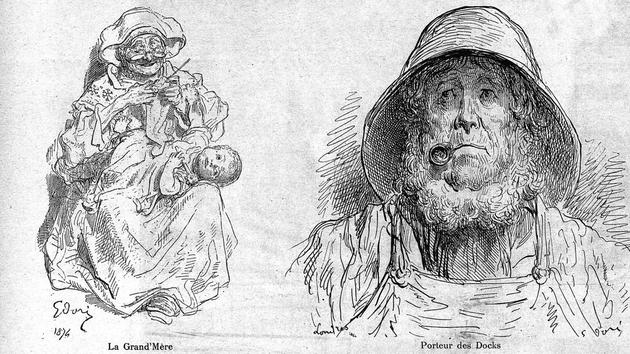THE FIGARO ARCHIVES – The weight of words, the beauty of a drawing, the magic of a melody. Brushes, feathers and sheet music delight our weekly selection.
A hand still armed with a pencil, a brush, a feather, the artist Gustave Doré opened our week, the January 23, 1883, anniversary date of his death. During the funeral of the famous artist, the crowd invades the Sainte Clotilde church in Paris and follows the convoy to the Père-Lachaise cemetery. Alexandre Dumas, son, gives a touching speech, the emotion is general. “What rapidity, what originality of conception, what inexhaustible and unforeseen imagination, what miraculous science of ordering and effect… What a world of gods, goddesses, fairies, saints, martyrs, heroes, virgins , giants, of monstrous or funny or divine types, suddenly taking birth, shape, color, movement and life in this luminous brain ”reports Le Figaro. Gustave Doré has indeed given shape to the hero of Rabelais, Cervantes, de la Fontaine, Victor Hugo or even Balzac. A “marvelous improviser, the most marvelous improviser of the pencil that has existed” affirmed Émile Zola.
Read also :Gustave Doré, the ogre of the arts
Art critic and friend of painters, another side of Émile Zola. But it is for his journalistic pen that we mentioned him the January 26 recalling his magnificent plea for animals which appeared in front page of Le Figaro in 1896. At the start of 2021, the National Assembly is examining a bill on animal abuse. “A creature that suffers and has no way of making us hear how and why it is suffering, isn’t that awful, isn’t it scary?” proclaims the great writer. This article assures him of a reward from the Society for the protection of animals, giving him an honorary prize. Defender of animals, the writer lived surrounded by animals in his house in Médan: cats, dogs, a farmyard, rabbits, roosters, chickens, geese, ducks not to mention a cow and a donkey according to the book Beasts and People of Letters by Georges Docquois (Flammarion, 1895). Quite naturally, the author mixes his animals in his novels: a cat in Thérèse Raquin or a big red cat in Nana to quote only those.
Read also :Zola in Le Figaro in 1896: “Why does the suffering of an animal so upset me?”
After the words, make way for musical notes. The January 27 1901, the great composer Giuseppe Verdi died in Milan. The musician embodies the romantic breath of the 19th century, a friend of Italian patriots wishing to achieve national union. “Viva Verdi” becomes a political rallying slogan. All of the musician’s great works refer to the turbulent political history of the Italian people. In his time, Verdi remains the most famous composer with Wagner. “No sovereign has ever known, I affirm it, such affectionate effusions, such apotheotic pomp” exclaims Alfred Bruneau in Le Figaro. During a performance of one of Verdi’s last works, in the room crowded with “spectators from all over the world, what delirious enthusiasm” he adds. His operas are still the most sung on stages around the world.
Read also :Giuseppe Verdi cried by all Italians on January 27, 1901
If you like history, join us on @figaroarchives
– .

![[전국]A confirmed migrant worker was caught 10 hours after sleeping in Chungju, North Chungcheong Province [전국]A confirmed migrant worker was caught 10 hours after sleeping in Chungju, North Chungcheong Province](https://image.ytn.co.kr/general/jpg/2021/0130/202101302201291508_t.jpg)
